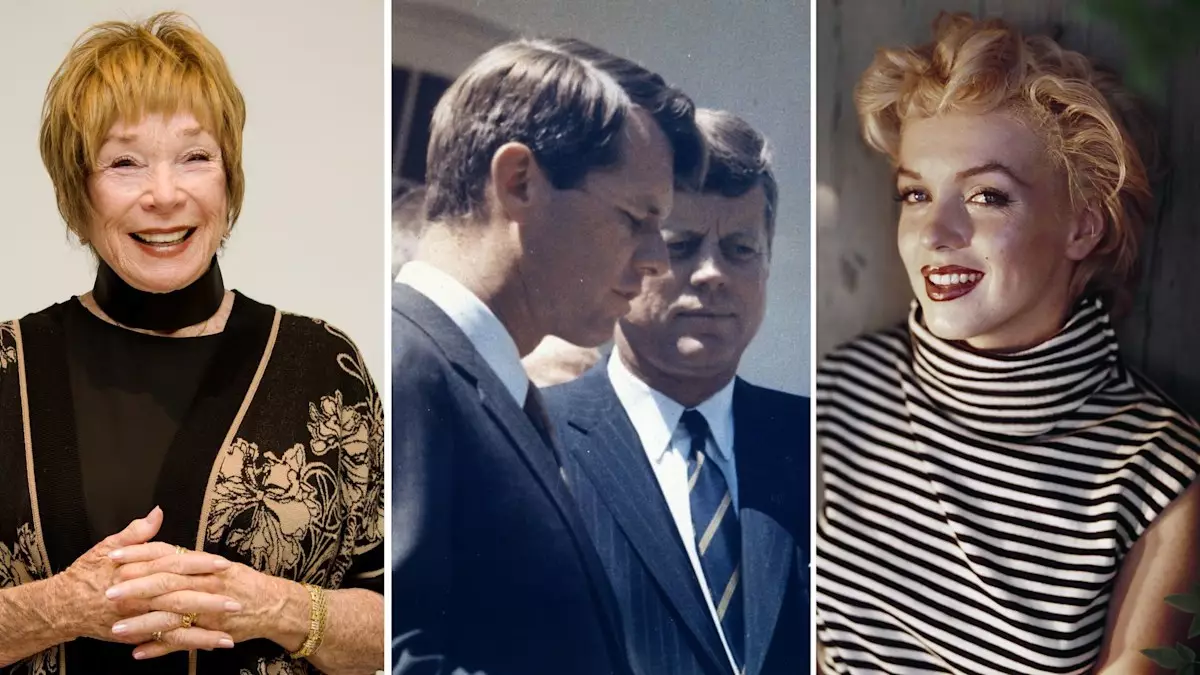The intertwining romances of the elite, particularly those involving major political figures, have always provided a fertile ground for gossip and intrigue. The alleged affair between President John F. Kennedy (JFK) and the iconic actress Marilyn Monroe is a narrative that has captured the public’s fascination for decades. Each new detail that surfaces only deepens the mystery surrounding Monroe and her connections to the powerful Kennedy clan. Recently, actress Shirley MacLaine has added a remarkable claim to this already complex tale, suggesting a potential liaison between Monroe and JFK’s brother, Bobby Kennedy. This revelation not only adds another layer to the storied life of Monroe but also raises questions about the moral fibers of those who basked in fame and political influence during the turbulent 1960s.
Shirley MacLaine’s Bold Revelations
In her recent publication, *The Wall of Life: Pictures and Stories from this Marvelous Lifetime*, Shirley MacLaine discloses an intriguing scene from a 1962 soirée linked to JFK’s 45th birthday that took place at Madison Square Garden. The ambiance of the night is almost tangible; while Monroe serenaded JFK with her well-documented “Happy Birthday” rendition, MacLaine recounts a curious event that occurred shortly after. According to MacLaine, she witnessed JFK exiting a bedroom with Monroe, only for Bobby Kennedy to swiftly enter afterward. By sharing this anecdote, MacLaine not only exposes the deeply entrenched connection between the three individuals but also implies an ambiance of permissiveness that surrounded the Kennedy brothers—a lifestyle defined by clandestine relationships and unrestrained ambition.
The historical context is vital here. The early 1960s were characterized by both an exuberant celebration of American culture and an increasingly complex socio-political landscape. The Kennedy administration, often idolized, was also shadowed by rumors and scandals, and Monroe—an emblem of Hollywood glamour and vulnerability—seemed to embody the tension between public adulation and private despair. MacLaine’s narrative invites us to reconsider not only Monroe’s relationships but also how they reflect the broader themes of power dynamics, exploitation, and the fragility of human aspirations in a world rife with contradictions.
The aftermath of that fateful evening at Madison Square Garden resonates through history. Monroe’s iconic performance, often remembered as a dazzling public moment, was tinged with personal tragedies that remained hidden from public view until her untimely death just months later on August 4, 1962. The emotional fallout from her relationship with JFK, which reportedly strained his marriage with Jackie Kennedy, reached a tipping point following the birthday celebration. Jackie’s ultimatum reportedly forced JFK to sever ties with Monroe. This separation illustrates the often harsh realities of living life under public scrutiny where personal relationships can drastically shape political narratives.
Furthermore, the shootings of both JFK and Bobby Kennedy soon after only amplify the tragic dimensions of this saga. Each death marked a substantive loss not just for their family but also for a nation deprived of its burgeoning leaders—men who had, through their public personas and private behaviors, symbolized both hope and betrayal.
Shirley MacLaine is no stranger to intrigue, both in her cinematic career and her personal life, which often danced at the complex intersections of fame, spirituality, and emotional exploration. Her latest memoir not only provides an intimate glimpse into her storied career but also presents an opportunity to reflect on the implications of Hollywood’s glamorous yet often detrimental lifestyle. MacLaine’s candid sharing of her interactions with revered co-stars, including her humorous recounting of a rejected proposition made to Morgan Freeman, only further solidifies her position as a figure of charm and tenacity within the entertainment industry.
There’s an undercurrent in MacLaine’s work that seeks to unravel the myth surrounding both her life and the lives of those connected to her. Through her memoir, she offers a new lens through which to examine the often-guarded lives of Hollywood stars, revealing their relational dynamics as both intrinsically human and profoundly affected by the pressures of fame. In doing so, she challenges readers to consider the hollowness that can accompany dazzling success while simultaneously celebrating the resilience that can emerge from personal vulnerability.
Ultimately, the lyrical intersections of Monroe’s relationships with the Kennedy brothers are emblematic of a larger cultural narrative, one that critiques the American dream while acknowledging the allure of celebrity and power. It reveals that what glitters may not always signify happiness and that the stories behind the spotlight can often be as complex and fraught as the times we live in. As new revelations continue to emerge, like those from MacLaine’s book, they remind us how intertwined the lives of public figures remain with their personal choices—choices that can echo throughout history and continue to shape perceptions of both the individuals involved and the eras they inhabited.

